
Will the Christian Right be out in force come the November mid-term elections? And if so, behind which political party’s banner will they now march?
A conversation with Amy Sullivan, a former aide to former Senator Tom Daschle currently writing a book on faith and the Democratic Party, Ross Douthat, an associate editor at Atlantic Monthly, and John Green, a senior fellow at the Forum and co-editor of the new book The Values Campaign? The Christian Right and the 2004 Elections. The discussion was moderated by Mark O’Keefe, Associate Director, Editorial, Pew Forum on Religion & Public Life.
In the following excerpts, ellipses have been omitted to improve readability. Read the full transcript.
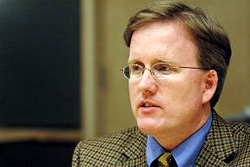
MARK O’KEEFE: John, you point out in the new book you co-edited that, “The movement’s obituary has been written several times and was considered moribund after the 2000 election, only to display its influence once again in 2004.” As we approach the mid-term elections, many are describing the movement as potentially lethargic. What’s your prognosis for the Christian right come November 7?
JOHN GREEN: The Christian right has had a history of ups and downs, where people have seen Christian insiders as either being 10 feet tall and dominating American politics or moribund. The truth of the matter lies between those two extremes. They have had years when they were more successful than others and years when they had a great deal of difficulty achieving their purposes. I suspect that this will be one of those years when it will be fairly difficult for the Christian right to mobilize its voters and have the kind of influence in campaigns that they would like to have. That is not to say that they will be inconsequential.
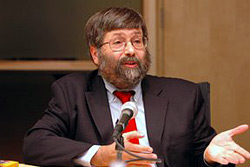
The Christian right faces some real impediments this year. Some of it is just the general disillusionment with the Bush administration. This is very typical in American politics; the longer a president is in power, the longer a party holds control of the executive branch, the more unpopular they become. So what we’re seeing in 2006 is the reassertion of a very common pattern, and that pattern affects Christian conservatives as well as other kinds of voters.
But in addition to that, there are some other problems. Many Christian conservatives believed they played a critical role in electing George Bush and the Republican Congress, and neither have delivered on the agenda they thought was so important. The recent revelations about Congressman Mark Foley have added to that sense of disquiet about the Republicans.
In response to that situation, it’s clear to me that the Christian right organizations like Focus on the Family, the remnants of the Christian Coalition and other groups at the state level are going to make a tremendous effort this fall to get their voters out to the polls in the face of these challenges. I suspect that they will have some success, but probably not to the level that we saw in 2004 or 2002.
The simple answer is if the disillusionment is large, it will be bad news for the Republicans. We may not see a wholesale desertion of Christian conservatives from the Republican Party; we may see depressed turnout. It might be very significant in some races, maybe less significant in others, but a lot of the contested House and Senate races are so close now that even a modest decline could make a difference. You wouldn’t have to have a huge desertion of the Republicans, just a 5 or 10% drop.
O’KEEFE: Now that the 2004 exit polls have been scrutinized, analyzed, and some would say overly emphasized, how important were moral values and “values voters” to the outcome? Amy, what did you think about the emphasis on the moral values exit poll question?
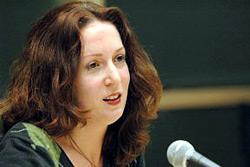
AMY SULLIVAN: As someone who is trying to get Democrats to pay more attention to values issues and to cultural anxieties that voters have, I was happy to have people misunderstand the exit polls. (Laughter.) But I do think it’s clear that issues like national security and foreign policy seemed to weigh more heavily on voters’ minds when they were making their decisions in 2004 than these so-called values issues.
However, those issues do act as threshold issues for a large segment of voters. By that I mean most voters don’t go home at night and worry about abortion and gay marriage, but those issues are proxies for deep-seated concerns they have about the culture, about the stability of families, about how hard it is to raise their kids and battle with popular culture. In the absence of the Democratic Party addressing those concerns head on, Republican solutions to those concerns, whether it’s banning abortion or banning gay marriage, at least strike somewhere within the same realm.
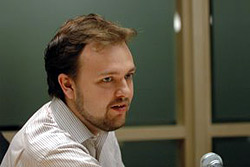
ROSS DOUTHAT: The values theme tied in easily to the way Republicans were trying to paint John Kerry, but also the way he actually was. You saw this particularly in his blundering statements on abortion and Catholicism. It wasn’t so much that a majority of the American public that wanted the Catholic bishops to deny him communion, or even agreed with the Catholic bishops about abortion generally, but the perception Kerry created was of a candidate who was what the Republicans said he was, which is to say aloof, elitist and out of touch with bedrock religious values. Even at the height of the Lewinsky scandal Bill Clinton never gave that impression because you believed whatever Bill Clinton thought about the issues, he really was a religious man who took his faith seriously. Voters pick up on that. Whether it’s the determining factor, who can say, but it’s clearly an important factor.
[Strickland is]
making some significant inroads into the religious vote in Ohio. He probably won’t win a majority of evangelicals but he may do very well among Roman Catholics and among mainline Protestants.
DOUTHAT: This is made possible, though, not only by the Democrats finding God after 2004, but by the political weakness of the Bush administration. There are different models with which you can approach American politics. You can mix social conservatism with economic libertarianism; you can mix social conservatism with economic protectionism and so on. What the Democrats in a lot of places are doing is moving back towards some version of the traditional New Deal model, which is not the New Democrat Clintonian free marketer approach to politics, but much more a wedding of social conservatism to an economic message that resonates with the working class, particularly now when the economy is doing well for a narrow section of the population but isn’t doing as well for people without college degrees.
This is an area the Democrats have tried to exploit for a long time. There wasn’t quite so much of the religious element, but the Al Gore campaign in 2000 had a people-versus-the-powerful rhetoric, and a lot of failed campaigns in the ‘70s and ‘80s tried to go back to this model. The model becomes available as the Republican economic message seems not to be working. You can peel off a lot of those Catholic voters who had moved to the right on social issues and felt the Republican economic message was not, per se, the right message, but had made peace with it, thanks to either a booming economy or at least an economy that seemed to be doing well by them.
[Catholics are]
The reason Catholics are the swing vote is because the Catholic population has become so assimilated in the last 30 years. Catholics, more than any other American religious group, vote like the country as a whole, and the Catholic Church is a broad enough tent that it includes people of all religious persuasions in a way that most evangelical and Protestant denominations generally don’t. There are Catholic traditionalists, Catholic moderate traditionalists, Catholic centrists, Catholic liberals, Catholics who approach what we would think of as secularism.
So it’s not that you need to appeal to Catholics per se; it’s just that tracking Catholics makes a good proxy for tracking the rest of America. The success of the Bush administration in the last six years does reflect its ability to blunt the edges of Republican big business and economic libertarianism with ideas like compassionate conservatism, faith-based initiatives and fighting poverty. Many of these ideas haven’t been put into practice, but rhetorically, at least, they have removed weapons from the Democratic quiver that used to appeal to voters. But now the Republicans are reaching the day of reckoning, when the Bush administration has spent six years saying one thing and not quite doing it, or saying one thing and doing another, and now there is an opening for Democrats to run through — economic populism joined to social moderation.
O’KEEFE: John, you and others have said same-sex marriage was a pivotal values issue in 2004, giving President Bush and Republicans an important edge in Ohio and other key states. What do you see as the pivotal values issues this November?
GREEN: The same-sex marriage issue may exhaust itself soon. I don’t think it will be this year but it will be soon, for a couple of reasons. One, all the states where it’s easy to put it on the ballot will have had it on their ballot in the near future – if not this year, then in 2007. Two, look at the way the courts are behaving. Remember, part of what sparked this whole issue was the decision of the Massachusetts Supreme Court to legalize same-sex marriage. But in courts in very liberal states like California and New York, these state statutes with the traditional definition of marriage have been upheld.
The fear of religious conservatives that “activist judges,” quote, unquote, were going to undermine traditional marriage everywhere has been reduced somewhat because the courts are not behaving like the Massachusetts Supreme Court uniformly across the country. So this issue that was critical in galvanizing Christian conservatives in 2004 may be running its course, and by 2008 it’s possible that this issue will have faded away.
I don’t know what the next issue will be. But I do know what Christian conservatives are trying to do: They’re trying to make foreign policy the next social issue. We have people like James Dobson, from Focus on the Family, talking about the war on terror as a family value, you know, protecting the family, which may be a little bit of a stretch.
DOUTHAT: In 2004 there was a conflation of the war on terror with these larger moral values questions, in part because that was Bush’s whole persona, and elections tend to hinge, to a certain extent, on what the candidates’ personas are. But that attempt is going to founder, primarily on the incompetence with which the war on terror is being waged, at least by the present administration. Events in Iraq, in particular, have made the idea of a Republican coalition in which all the parts work together – in which being anti-abortion goes well with wanting to invade Iraq – it’s made that untenable, at least in the near future.
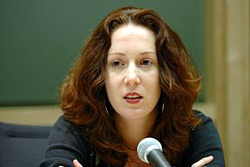
SULLIVAN: I have a feeling this election is not going to be very useful in giving us a solid picture of where the electorate is and what social issues are moving people. We are likely to see something close to the midterm election in 1974 when you have a lot of depressed turnout on one side. Some of that was already in the works leading up to the past few weeks. As John said, there is disillusionment, not only among religious conservatives, but also among religious moderates who feel there is not the home for them in the Republican Party they had once thought. Instead of feeling there was no other option for them, and they simply had to vote Republican because it was their Christian duty to keep Democrats out of office, moderates are now hearing from a different kind of Democratic candidate in some places that makes it a little more palatable for them to support that party.
But certainly with the Mark Foley story coming up, I think that’s the last straw for a lot of folks who were on the edge about whether or not to weigh in with this election. They may simply stay home, which won’t tell us much about what will motivate them in 2008.
I have done a number of radio shows now, conservative radio shows, where they will play me some stupid comment that Bill Maher makes about religion and then say, “This is what is hurting the Democratic Party.” I just want to say, “I will stop holding Pat Robertson and Jerry Falwell against Republicans if Republicans will stop holding Barbra Streisand and Whoopi Goldberg and Bill Maher against Democrats.”
DOUTHAT: I would happily ban both Bill Maher and Pat Robertson – (laughter) – from all public utterances. But the problem for Democrats is that while Pat Robertson is a fringe kook, he is a fringe kook who is a little bit closer to the American mainstream, or at least he presents himself that way.
SULLIVAN: He wants to assassinate world leaders.
DOUTHAT: If we are talking about assassinating world leaders, that is very close to the American mainstream. I bet if you took a poll right now of whether we should assassinate Kim Jong Il, we could get 85 percent of Americans to say we should. I think when Pat Robertson says things like that he is actually representing the raging id of about two-thirds of the country. (Laughter.)
Speakers at Pew Forum events are given an opportunity to review and approve their remarks. This transcript also has been edited for clarity, spelling and grammar. Read the full transcript.